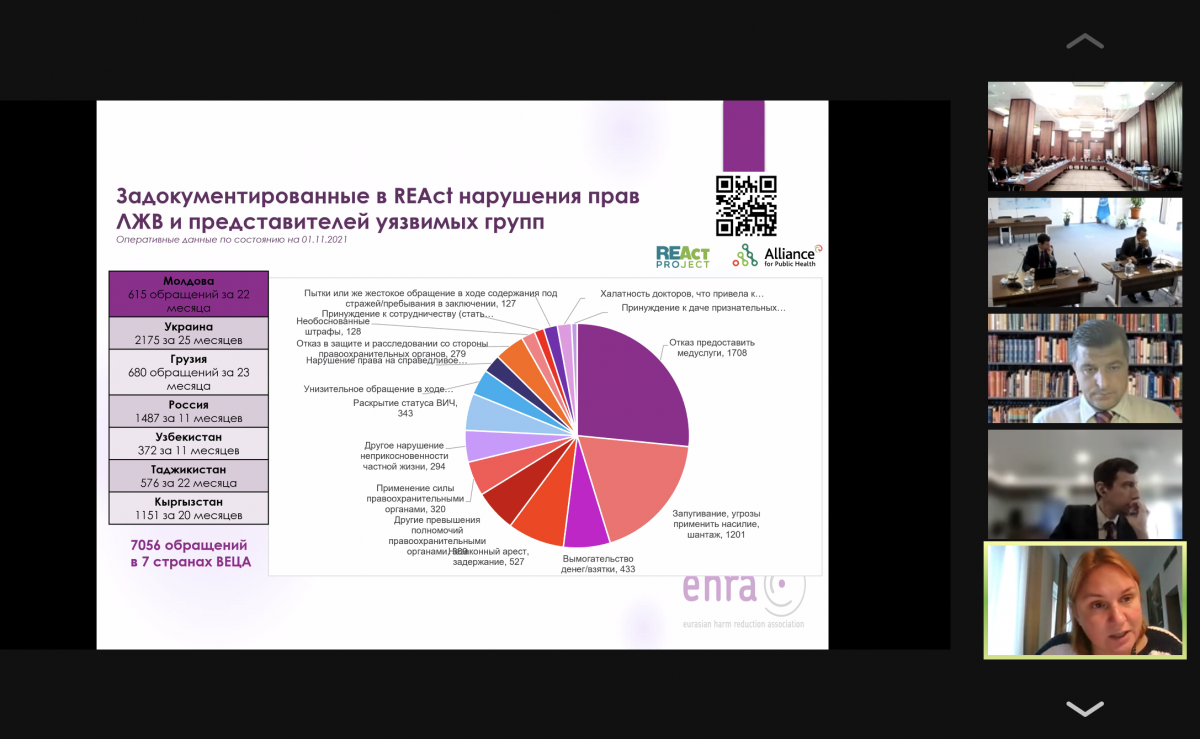During the Third session of the Eastern European and Central Asian Forum of Judges on HIV, Human Rights and Legislation, organized by the UNDP regional team, on November 11, representatives of government agencies and international non-governmental organizations discussed the problems of access to justice in the EECA region for people who use drugs, sex workers, LGBTQ and people living with HIV, including during the COVID-19 pandemic.
Analysis of the situation shows that the key types of violation of rights are the following:
- Discrimination in health care facilities and barriers to accessing services;
- Lack of social support and problems with housing, work;
- Arbitrary detention, police violence;
- Abuse of power by child protection services, deprivation of parental rights;
- Failure of the state to protect against gender-based violence (access to shelters, prosecution of perpetrators).
Ganna Dovbakh, Executive Director of the Eurasian Harm Reduction Association (EHRA), presented data on violations of the rights of PLHIV and representatives of vulnerable groups, collected in 7 countries of the region using the REAct monitoring system. The data was accumulated in Moldova, Ukraine, Georgia, Russia, Uzbekistan, Tajikistan and Kyrgyzstan.
In less than 2 years, para-lawyers collected 7056 appeals from key vulnerable groups. Most of the violations were related to the refusal to provide medical services. This type of incident was recorded in 1708 hits. Among other common violations, the speaker also noted intimidation, threats, violence, blackmail and coercion by the police to confess guilt. Such cases should be viewed as common practice and not as rare exceptions.
Moreover, Ganna noted that people are often not ready to talk about violation of their rights, because they are afraid that this will further worsen their situation. The speaker drew attention to frightening statistics compiled by the REAct, about a rather low percentage (less than 10% on average) of acquittals by judges in EECA countries, especially if the case is filed by the police. Therefore, illegal actions, torture, blackmail on the part of law enforcement agencies in relation to representatives of key communities have such a negative impact on people’s readiness to defend their rights.
As part of her presentation, Ganna also presented results on the most common legal barriers and human rights violations that beneficiaries experience when accessing public health services, which were collected under the regional project “Tiberius: Overcoming Legal Barriers for Key Populations – Towards 90 -90-90”, implemented by the EHRA. Namely:
- Lack of registration and documents, which leads to a lack of insurance and the need to pay for COVID-19 PCR before receiving inpatient treatment;
- Stigma and discrimination by healthcare professionals and government authorities;
- Refusal to provide social assistance by social welfare authorities;
- Disclosure of personal data and HIV status by healthcare professionals and service providers;
- Violence in family;
- Workplace discrimination.


